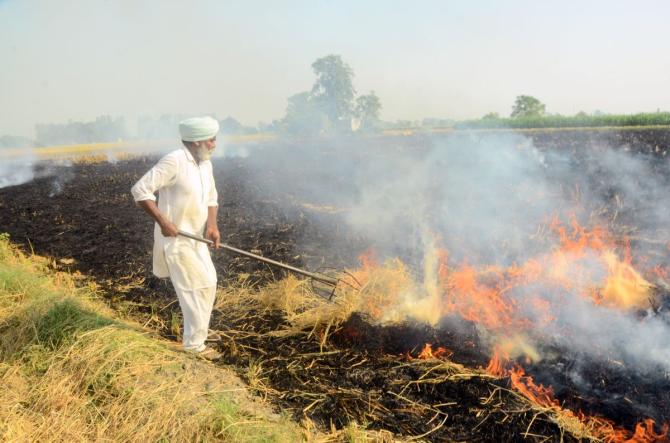Irrigation woes have contributed to the problem of stubble burning in the state, reports Sarthak Choudhury.

Stubble burning or the practice wherein farmers burn crop residue to prepare their fields for sowing, has been the focus of a political slugfest between Punjab and its neighbouring states, especially the national capital region (NCR), where the phenomenon leads to a huge spike in pollution levels around this time every year.
After paddy is harvested in late September and early October, the fields are left with stalks, some of them as high as two feet.
Since the sowing of wheat begins in late October, farmers are left with little time to remove the stubble and the quickest and the cheapest way to do so is to burn it.
The government of the Aam Aadmi Party in Delhi routinely blamed the Punjab government for not doing anything to solve the problem.
However, after it came to power in the state last year, the ruling AAP has tried to address the issue with a number of steps such as increasing the budget for containing stubble burning and providing cash incentives to farmers who refrain from indulging in the practice.
This year Punjab has allocated nearly Rs 350 crore to stop stubble burning -- a 75 per cent increase from the Rs 200 crore allocated to it last year.
In contrast, the state had allocated Rs 40 crore to the cause in FY22 and a meagre Rs 1 lakh in FY21.
"Iss saal Delhi tak dhua nahi jaayega (The smoke won't reach Delhi this year)," says Lakhwinder Singh, a farmer in Peer Mohammad, a village in the district of Firozpur in Punjab.
Business Standard spoke to farmers across four districts in Punjab to get a sense of the problems they face and why some of them continue to burn stubble.
Nearly everyone said that the main reason for continuing the practice was the government's apathy and its reluctance to go all the way to help them.
"Do you think we enjoy burning stubble? Before the smoke reaches Delhi, it is inhaled by our children, our elders, and our women, some of whom are pregnant and have breathing problems. ... And yet we have no choice but to burn the stubble," says Pargat Singh, a farmer in Mathu, a village which lies 50 kilometres from Firozpur.
He adds that the government should adhere to the National Green Tribunal (NGT) order of providing farmers with machinery to remove stubble from their fields.
The NGT in 2015 had directed state governments to provide farmers with machines and facilities for the collection and removal of stubble.
"The order said that farmers with less than 2 acres of land should get the machines free of cost and those with up to 5 acres should get Rs 25,000 along with the machines," says Pargat Singh.
"For farmers with more than 5 acres of land, the government is supposed to provide subsidies worth 50 per cent of the cost of the machines. But we also need tractors to which these machines are attached and tractors cost up to Rs 10 lakh," Singh added.
In any case, it is only a small proportion of the farmers who have received this incentive, he adds.
Some say that the prices of the machinery are inflated before they get the subsidies.
"So a machine that costs Rs 3 lakh is often sold for Rs 4.5 lakh by designated sellers. So even with the subsidy, the farmer ends up paying more than he should be paying," says Kulvinder Singh, a farmer in Bhawanigarh, a town 19 kilometres from Sangrur.
The allegation could not be verified independently.
In the past, a number of companies have tried to help farmers reduce stubble burning, but with little or no success.
According to officials cited in several reports, the National Thermal Power Corporation had promised to use 20 million tonne of stubble for four years to turn it into biofuel, but managed to get only 3.5 million tonnes.
The State-run firm has also been running sustained ad campaigns for the cause since November 2017.
NTPC officials say that the problem is more one of supply.
They say that none of the stubble-burning states invested in or incentivised the setting up of units for making biofuel pellets from farm residue.
Another farmer pointed out that irrigation woes have contributed to the problem of stubble burning in the state.
Since the advent of the Green Revolution in the 1960s, Punjab shifted from farming diverse crops (moong, jowar etc) to a two-crop cycle of paddy and wheat.
With the changing face of farming in the state, the water-guzzling paddy started dominating the fields in Punjab.
This resulted in depleting ground water levels and to tackle the issue, the state introduced the Punjab Preservation of Subsoil Water Act in 2009.
The law allows paddy to be planted only after a date fixed by the government which is post the onset of monsoon.
It was argued that this would help farmers benefit from the rains instead of having to rely on groundwater.
However, a study published in October 2021 showed that the law had made no difference, and amongst all the states, groundwater extraction was the highest in Punjab -- as much 66 per cent more than the extractable limit.
Some farmers say that because they have to delay the planting of paddy, the harvest is delayed too, which leaves them with little time to prepare the fields for the sowing of wheat.
Hence, they resort to stubble burning.
"It is unfair to blame just the farmers for the depleting groundwater. We use the groundwater because we barely get anything from the rivers. The river water is mostly sent to other states, so the farmer has to look at alternate means like groundwater. At least we use the groundwater to grow food for the people. Look what the industries are doing. They flush toxic water back into the rivers and the ground. Nobody says anything to them. We have become easy targets," says Karamjeet Singh, a farmer in Dehlon, a district 19 kilometres from Ludhiana.
In Abohar, a place famous for the cultivation of Kinnow, and often referred to as the California of Punjab, depleting groundwater levels have affected the area and the harvest.
When asked if they would want to return to crop diversification, a farmer, who chooses to remain anonymous, says it might be fruitful only if the government looks into two things -- facilities such as farmer-friendly schemes and a minimum support price (MSP) for crops.
Feature Presentation: Aslam Hunani/Rediff.com











